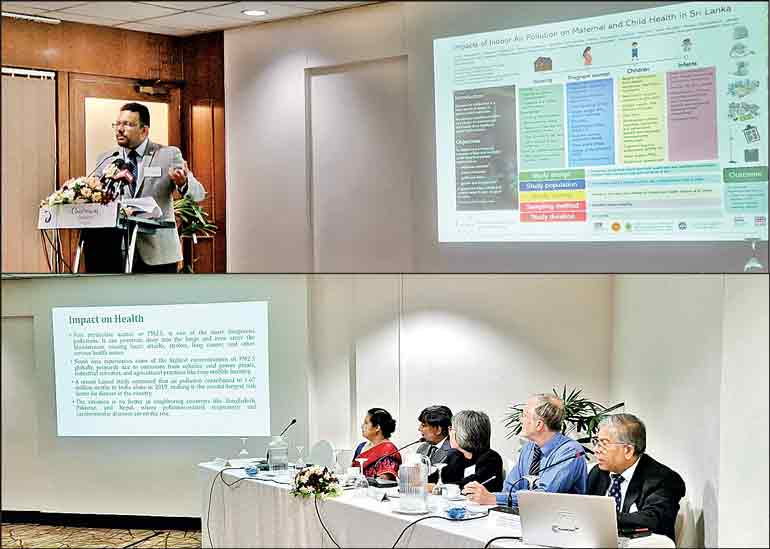Thursday Feb 26, 2026
Thursday Feb 26, 2026
Friday, 30 August 2024 00:12 - - {{hitsCtrl.values.hits}}

Respiratory conditions are responsible for one in five deaths globally. This week, respiratory health experts from across the world convened in Colombo to further cross-country collaboration and showcase the breadth of research being conducted to decrease the burden of respiratory disease in the Asian region.
The National Institute for Health and Care Research (NIHR) Global Health Research Unit on Respiratory Health (RESPIRE)’s Annual Scientific Meeting runs from 27 to 29 August, and is the research unit’s first time convening a conference in the country since its inception in 2016, highlighting the need for further investment into respiratory health research in Sri Lanka.
The three-day meeting included an inauguration ceremony and external showcase on 27 August, where honoured guests from the Health Ministry, the Sri Lankan Medical Association, the Sri Lanka College of Pulmonologists, and Allied Health Faculties of Sri Lankan universities will reflect on priorities to ensure better respiratory health in the region. Research teams will present the latest from their studies and discuss ways forward to improve global respiratory health. Respiratory diseases have a major impact on the Sri Lankan health system. Together, chronic respiratory diseases (CRDs) and pneumonia caused the highest number (18%) of Sri Lankan hospital deaths in 2017.
Comparisons of proportionate mortality data during the past decade revealed a rising trend of deaths in hospitals due to these two conditions. Among chronic respiratory diseases, asthma and chronic obstructive pulmonary disease (COPD) are the two leading diseases causing the highest burden of disease and deaths. Childhood wheezing is a major cause of school absence, and in adults, asthma and COPD have a high prevalence of 11% and 10.5% respectively.
Poor air quality is claimed to be responsible for the rise of many respiratory diseases, including lung cancers.
Urbanisation and the exponential increase in motor vehicles have been linked to poor ambient air quality throughout the country. Just as outdoor air pollution is a concern in cities, indoor air pollution threatens rural communities, where firewood is used for cooking in poorly ventilated kitchens. Late-onset wheezing has been observed to be more prevalent among non-smoking women from rural communities exposed to kitchen smoke.
Sri Lankan researchers from the Universities of Sri Jayewardenepura, Peradeniya, and Wayamba have selected indoor air quality as their research focus under the RESPIRE collaboration, due to it being largely understudied despite its wide scope. The health effects of indoor air pollution due to biomass fuel consumption on pregnant mothers and children will be studied in two main districts – Colombo and Kandy.
They will also study the existing legislation on air pollution and tobacco to identify gaps and rooms for improvement. The researchers believe the work will generate important findings that could be used to uplift respiratory health in Sri Lanka.
In 2019, CRDs were the third-leading cause of death globally, responsible for 4 million deaths with a prevalence of 454.6 million cases. Despite the coronavirus pandemic positioning respiratory health as a key public health concern, there is an ongoing need for local and regional research to provide the evidence needed to implement best practice and care. With the support of collaborations like RESPIRE, governments and policymakers can draw on findings to inform policy to improve respiratory health for its people.
RESPIRE aims to reduce the number of deaths and wider health and societal impacts from respiratory diseases in South Asia.
Co-led by the University of Edinburgh and Universiti Malaya, RESPIRE partners based in Bangladesh, Bhutan, India, Indonesia, Malaysia, Pakistan, and Sri Lanka collaborate to deliver low-cost, scalable policy and clinical interventions to reduce respiratory disease and death in Asia.
RESPIRE’s research programs cover infectious diseases – for example, tuberculosis and pneumonia, non-communicable diseases – including asthma and COPD, preventable risk factors – such as air quality and tobacco usage, and the impact of climate change on respiratory health.
RESPIRE is funded by NIHR 16/136/109 and NIHR132826 using UK international development funding from the UK Government to support global health research.